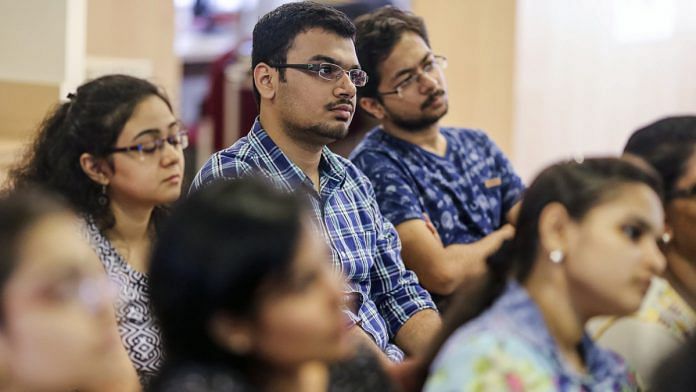The country is being ravaged by coronavirus and faces several challenges. There is China, economic growth, dissatisfied farmers, helpless migrants, an overwhelming threat of having your account blocked for no reason and of course, our favourite problem — inflation.
But there is a problem that underlies all other problems, something invisible and yet more insidious than any of the above combined — our complacency with everything.
Something strange has happened since we were children. I was led to understand that politicians are corrupt, that governments are inept and do not do “enough”. It was normal to lament political ineptitude and corruption.
This was also the time when climate change became a household topic. I remember as children, we used to come home scared on days that we were taught about global warming. We concocted realistic, apocalyptic scenarios of everyone drowning in the sea and on those nights, I begged to sleep in my parents’ room.
At the same time, there was an unshakeable optimism — my parents finally found a plot to build a house and they would tell us that its price would double in the next 10 years. All around us, the ‘didis and bhaiyas’ of the colony would get fancy jobs around the world. When they came back home for vacations and played cricket with us, we felt we were in exalted company. We grew up thinking that someday that will be us, if we could just copy the accent.
But then things changed and they changed somewhat gradually and unnoticeably.
How one defines ‘normal’
American legal scholar Cass Sunstien in his book ‘This is not Normal’ talked about the fact that our sense of normal defines what we find reprehensible. For instance, imagine how ludicrous the debate on toxic masculinity would be in 18th century India — a society that was comfortable with burning women on funeral pyres, among other atrocities.
He calls this process ‘opprobrium contraction’. In simple words, it means that when our normal is dreadful, our anger towards injustice also shrinks and more wrongs become invisible.
An opposite condition is ‘opprobrium expansion’, which is brought about by rights activists, visionaries and other change agents. As our sense of normal changes towards the better, we start finding more faults and reform further.
Moreover, these processes occur slowly, over time. As a result, when opprobrium contraction erodes our most cherished institutions, we do not notice it and may even defend it. At an experiential level, we just keep living. I guess that is what has happened as we millennials have entered our twenties. The world has undergone an opprobrium contraction.
We have stopped criticising our politicians (particularly those in power) and drawing room conversations have become a struggle between a desire to speak out one’s mind and pressure to maintain harmony. After all, you cannot be angry at your grandparents for believing that it is the people (not leaders) at fault for the second wave of Covid-19 or that the farmers and protestors are traitors.
What kind of a monster argues with their old and vulnerable grandparents? Or who has the guts to stand-up to jingoistic uncle-aunties when you know that your parents’ social life (and your peaceful existence) depends on their goodwill?
People are hopeless and ready to blame anyone
As our politicians became pure and incorruptible in public perception, our hopes seemed to have been dashed, leaving a rubble of indifference and resignation.
Why speak up about climate change? Will anyone listen to us? Or will they see a banner of “Fridays For Future” and label us anti-national, traitors and conspirators?
We will gladly bear more pandemics and some extra cyclones and heat waves, thank you.
We, as people are hopeless for our own lives and ready to blame anyone. We are okay with inequality, poverty, violence against Dalits and minorities, rapes, and even preventive detention, just as long as we can maintain a false sense of vulnerability. After all, who is more vulnerable than an upper-caste Hindu male?
We, the privileged, do not have jobs not because of government (in)action, but because Dalits, women, minorities and tribes have taken it all away — cue the defence mechanisms to rescue.
But the worst of it is the silence — we are all forced into a silence borne of opprobrium contraction, where some of us are silent in our screaming vindication of majoritarianism and others in their frustration and inability to speak for fear of offence, rape threats, being attacked and bullied, of being called an outsider or a traitor.
We, as a generation, are being forced into silence.
Every attack on free expression is contracting us further. Democracy is the best form of government as it allows quick identification of the problems because there is always a fault-finder cribbing about something or the other.
There needs to be an alternative between silence and shouting. I propose grumbling. The more we grumble, the less we demonise and deify, and reclaim our democracy.
Vidhu Shikhar is a student of Thapar Institute of Engineering and Technology, Patiala



